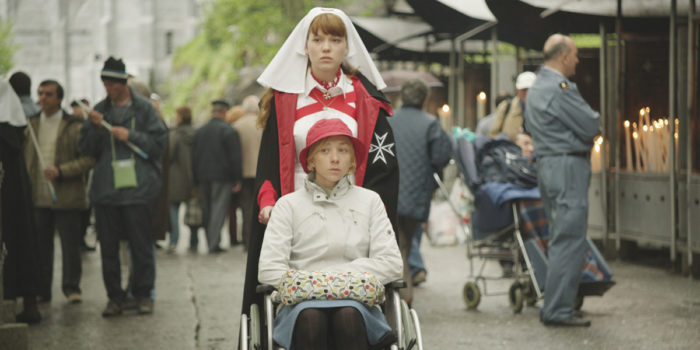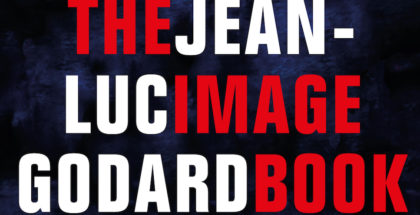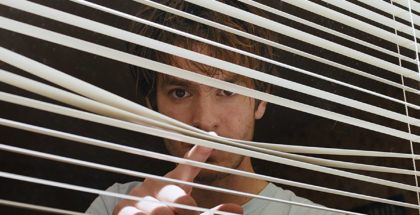MUBI Mondays: Lourdes (2009)
Review Overview
The Score
8Mise en scene
8Humour
8Katherine McLaughlin | On 24, Aug 2020
On Mondays, two of our resident cinephiles highlight a film currently available on MUBI UK. We call it MUBI Mondays.
If you’ve recently watched Austrian director, Jessica Hausner’s, first English language film, Little Joe, you’ll be aware that her mise en scene is ordered and immaculate and her observations nuanced and ambiguous. Her multi-award winning fourth feature from 2009, strikes a similarly comic tone, is co-written with regular collaborator Géraldine Bajard and stars Sylvie Testud as Christine, a wheelchair-bound woman with multiple sclerosis, on a pilgrimage to the iconic holy sanctuary in Lourdes.
Shot on location, sweeping visuals of the Pyrenees mountains are captured with a cool and elegant precision by cinematographer Martin Gschlacht, leading the viewer on a slow-burn and picturesque tour of the area. The processions, group prayer and bathing sessions, queues to enter the Massabielle grotto – where people believe the Virgin Mary appeared to a young Roman Catholic girl in 1858 – are all presented in painstaking detail. Hausner sets the scene as if the pilgrims are holidaying at an exclusive resort. Her palette of white and blue reflects the colours synonymous with the Madonna and it’s tempting to view the added use of a contrasting red as representing the French Flag, which in turns feeds into the bigger mirror the film holds up to society as a whole.
Testud’s graceful and affecting performance injects real pathos into Christine’s narrative of longing and hope for connection. The sly, prodding humour is communicated through the way the surrounding characters react to Christine’s sudden miraculous healing after a visit to the grotto. Envy rears its ugly head, and the flock begin to question the hand of god. There’s also a battle between selflessness and selfishness through Christine’s assigned carer, Maria (Léa Seydoux). Disinterested in her charge at first, even to the extent of leaving Christine alone and vulnerable to follow a flirtation, Maria reclaims her mantle of devoted protector for a photo opportunity following the supposed miracle.
Hausner uses famous religious hymns and organ music with subtly hilarious nous. At the turning point of the film, Johann Sebastian Bach’s Toccata and Fugue in D minor, BWV 565 (famously used in 1962’s The Phantom of the Opera) kicks in as Christine sits quietly in the pews, pondering this godsend and newly found strength. A bad omen for things to come.
A combination of tranquil observational drama and black comedy, Lourdes casts doubt over the rules of society by focusing on a specific setting. Hausner’s quietly provocative piece of arthouse cinema is a great example of her ever-expanding oeuvre as she continues her ingenious investigation into human behaviour.
Lourdes is now available on MUBI UK, as part of a £9.99 monthly subscription.




















